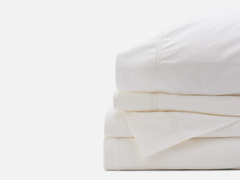Few things are more satisfying than falling into bed after a long day. In fact, the only thing that could spoil that feeling of slipping into a peaceful slumber is waking up to find that you’re still groggy and exhausted. Unfortunately, that is the reality many of us face every time we get out of bed in the morning.
This morning dilemma can stem from a plethora of reasons, from sleep disorders to everyday sleep inertia. But, surprisingly, the reason for our poor sleep sometimes revolves around the very tools that should help us nod off—our bedding. Want to know how to tell if your bedding is preventing sound sleep? Read on to find out.
The Difference Between Sleep and Sound Sleep
The reason we sometimes wake up feeling refreshed and sometimes wake up feeling like we got hit by a pickup truck has to do with the quality of our sleep. Just because you’re unconscious doesn’t mean that you’re getting good quality sleep. Good quality sleep means you fall asleep within 30 minutes, stay asleep for the whole night, and wake up feeling rested.
Many things can potentially disrupt the quality of our sleep. These include:
- Having an inconsistent sleep schedule
- Overeating before bed
- Alcohol consumption
- Sleep disorders
- Uncomfortable sleep environment
- Anxiety or depression
- External factors, such as a partner snoring or a child crying
Why Improving Sleep Is Important
Obviously, we can’t get a perfect night’s sleep every night. But if you’re getting poor sleep more nights than you are getting good, restorative, refreshing sleep, it may be time to take steps to create more restful nights. While feeling a little sleepy from time to time is no big deal, suffering from sleep deprivation can cause a bundle of health and safety issues. You might experience any of the following.
- Confusion and lack of focus
- Slower reaction times
- Impaired critical thinking skills
- Mood swings
- Exasperated anxiety and depression symptoms
- Higher risk of accidents
- Increased blood pressure
- Higher risk of obesity
In other words, sleep deprivation can make it difficult to operate at 100 percent at the job, in your studies, or with your family. Fortunately, learning the signs your bedding is causing you to have poor quality sleep is an easy step toward a better night’s sleep.
Signs That Your Bedding Is To Blame for Bad Sleep
It Takes a Long Time To Fall Asleep
As mentioned, taking a long time to fall asleep is one of the first signs you aren’t getting good quality sleep. And bad bedding may be the cause of it, depending on why you’re tossing and turning.
For instance, if you’re tossing and turning because you can’t get comfortable on your pillow or mattress or because your sheets are too itchy, it’s probably the bedding that’s keeping you up. If you’re only tossing because you’re restless, the issue may be overstimulation, emotional distress, or a need to get more activity during the day.
You Wake Up Sore in the Morning
We’ve all woken up sore the day after intense physical activity like heavy exercise or helping someone move furniture. However, if you wake up with a sore neck or back after a relaxed day and don’t have other medical issues, your bedding could be to blame—namely, your pillow.
Different pillows suit different sleep positions. A medium pillow is best for those sleeping on their back. If you sleep on your side, you should lean toward a firmer pillow and try a softer pillow if you sleep on your stomach. If you have lower back problems, the issue could be that you need an extra pillow under your lumbar region or below your legs.
You’re Sweating in the Middle of the Night
Many of us relate to this scenario: it’s the middle of a summer night, and you wake up sweating. You check the temperature of your bedroom, and it’s a comfortable 64 degrees. What happened? The issue here is probably less about the room or the season and more about your bed sheets.
As we fall asleep, our bodies seek to cool us off by releasing body heat. Our bed sheets, blankets, comforters, and quilts are supposed to trap that heat so that we don’t get too cold. But sometimes they do too good a job, and we end up sweltering. The trick is to find bedsheets that are light and breathable, especially in the summer months. Cotton is one of the best sheet materials for breathability (which is why we like to use it so much).
Pro Tip: Seasonality
The bedding that’s warm and cozy for the winter may be sweltering in the spring and summer. Sometimes switching from a duvet to just the duvet cover is the perfect way to get better sleep at night.
You Have Exacerbated Allergy Symptoms
A lot is happening on our skin. The natural oils, sweat, dust, pollen, and anything else we may have come in contact with tend to accumulate on our bodies. If you don’t shower before bed every night, all that debris ends up trapped in the fibers of your sheets or in your mattress, creating a nice warm, humid pocket where mold spores can grow.
That nasty thought alone may be enough to keep you up at night, but what’s worse is the fact that the dust, mold, and other material can exacerbate your allergy symptoms. And coughs, sniffles, and breathing difficulties don’t make for a great sleeping environment.
You’ve Been Using the Same Sheets for a Few Years
Even the best sheets have to reach the end of their careers eventually. After a few years, sheets tend to show wear and tear in places or experience pilling, which can make the sheets rough to the touch. This can make it hard to get comfortable, especially if you have sensitive skin or have sensory challenges. If you find you are waking up during the night or are uncomfortable, it could be a sign it’s time for your sheets to retire.
What To Do if Your Bedding Is Hurting Your Sleep
Fortunately, bad bedding is one of the easiest things to fix to get a better night’s sleep. In some cases, fixing the issue is a simple matter of washing your bedding. Otherwise, it may be time to swap out your sheets and pillows with something a little more breathable, comfortable, and well-suited to your sleeping style.
At Red Land Cotton, we provide just that with our high-quality cotton sheets made in the USA. With their 100 percent cotton percale weave, you can expect a light and comfortable night’s sleep. And don’t forget to check our collection for quilts, duvet covers, and pillowcases as well.



